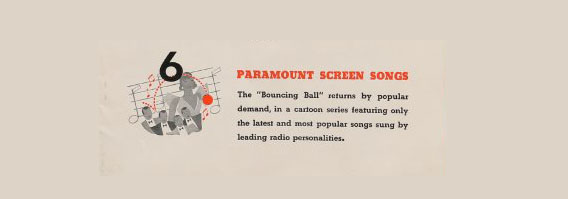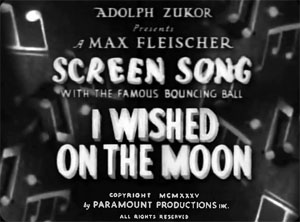
There had been no Screen Songs issued during the 1934-35 season. In 1935-36 they returned “by popular demand” according to the trade advertisements (above), but this time certain changes were made. Instead of featuring singers and personalities known from radio, each film featured dance bands known from radio, records, stage, or film. In fact, Paramount would feature the name bands in what the trades called “Vodfilm” presentations, combining the appeal of a live stage presentation by the band with a complete program of shorts and feature films. Paramount was also putting out numerous short subjects on the bands themselves, referred to in the trade as “tuners”. These featured such additional bands as Jimmie Grier, Anson Weeks, and Ina Ray Hutton and her Melody Makers, all without animation. Most bands were not exceptionally visual in their presentations – you would just see the musicians playing their instruments, dressed up to the nines. Further changes to the screen songs included the removal of the animated “second chorus” transformational lyrics – as well as the second chorus intself, which was generally presented instrumentally, with the audience invited to sing along “if they liked”, instead of goaded on to join in as in prior productions. (This may have been a tactical mistake in keeping audience interest, as Famous Studios’ later color revivals of the Screen Song would return to egging the audience on to sing good and loud.)
 I Wished on the Moon (11/20/35) – Featuring Abe Lyman and his Californians. Abe was no stranger to animation, having provided soundtracks to several of the first Merrie Melodies for Hugh Harman and Rudolf Ising, and was further no stranger to film appearances in general, his credits including “Pardon My Gun” for Pathe in 1930 – a comedy Western musical in which the band appeared in a dance hall sequence. As for the cartoon, The Portable Theatre Company consists of a dirigible which bombards a likely-looking lot with spare parts and bric-a-brac that assemble into a theater. The third time they try it, all the parts bounce off the sloped roof of a nearby building, and produce a misshapen mess that still draws a good crowd. The rest of the film is a takeoff on the movie-going experience, with standard tropes bent into cockeyed fashion by the misassembly of the movie palace’s components. The film introduces the poster boy for the remaining Screen Song series, Whiffle Piffle, a character nearly devoid of personality excepting a signature wobbly walk with limbs that appear to have no bone structure. His dialogue is delivered entirely in “Mercerisms” – under the breath mumblings delivered sotto voce. The entire audience finds itself seated facing the projection booth, then once the program starts, responds to an audible command of “About Face”. At the conclusion of the show, a screen announcement indicates the theater’s lease is is up, and tomorrow there’ll be a baseball game on that lot. The dirigible comes by and sucks up by vacuum all the components of the building, leaving everybody in the dust and Whiffle Piffle to wobble his way home. Songs: “And Then Some”, a 1935 pop, most successfully recorded by Ozzie Nelson on Brunswick. Paul Whiteman got it for Victor, Ray Nichols and his Four Towers Orchestra for Bluebird, and Joe Reichman for Melotone, Perfect, et al. Another new song, “Double Trouble”, is featured from The Big Broadcast of 1936, recorded by Ray Noble’s American band for Victor (without Al Bowlly), and as a vocal record by Babs and Her Brothers on Decca. “A Mile a Minute” also appears, only known from one recording by Johnny Green on Brunswick. The title song, also from The Big Broadcast of 1936, is best known from a Brunswick recording by Teddy Wilson featuring both Billie Holiday on vocal and Benny Goodman on clarinet. Lyman’s band features this number in the film with vocal by Bill Neely, his guitarist. Lanny Ross would record it as a vocal for Brunswick, as did Ruth Etting for Columbia, and Bing Crosby on Decca (below)..
I Wished on the Moon (11/20/35) – Featuring Abe Lyman and his Californians. Abe was no stranger to animation, having provided soundtracks to several of the first Merrie Melodies for Hugh Harman and Rudolf Ising, and was further no stranger to film appearances in general, his credits including “Pardon My Gun” for Pathe in 1930 – a comedy Western musical in which the band appeared in a dance hall sequence. As for the cartoon, The Portable Theatre Company consists of a dirigible which bombards a likely-looking lot with spare parts and bric-a-brac that assemble into a theater. The third time they try it, all the parts bounce off the sloped roof of a nearby building, and produce a misshapen mess that still draws a good crowd. The rest of the film is a takeoff on the movie-going experience, with standard tropes bent into cockeyed fashion by the misassembly of the movie palace’s components. The film introduces the poster boy for the remaining Screen Song series, Whiffle Piffle, a character nearly devoid of personality excepting a signature wobbly walk with limbs that appear to have no bone structure. His dialogue is delivered entirely in “Mercerisms” – under the breath mumblings delivered sotto voce. The entire audience finds itself seated facing the projection booth, then once the program starts, responds to an audible command of “About Face”. At the conclusion of the show, a screen announcement indicates the theater’s lease is is up, and tomorrow there’ll be a baseball game on that lot. The dirigible comes by and sucks up by vacuum all the components of the building, leaving everybody in the dust and Whiffle Piffle to wobble his way home. Songs: “And Then Some”, a 1935 pop, most successfully recorded by Ozzie Nelson on Brunswick. Paul Whiteman got it for Victor, Ray Nichols and his Four Towers Orchestra for Bluebird, and Joe Reichman for Melotone, Perfect, et al. Another new song, “Double Trouble”, is featured from The Big Broadcast of 1936, recorded by Ray Noble’s American band for Victor (without Al Bowlly), and as a vocal record by Babs and Her Brothers on Decca. “A Mile a Minute” also appears, only known from one recording by Johnny Green on Brunswick. The title song, also from The Big Broadcast of 1936, is best known from a Brunswick recording by Teddy Wilson featuring both Billie Holiday on vocal and Benny Goodman on clarinet. Lyman’s band features this number in the film with vocal by Bill Neely, his guitarist. Lanny Ross would record it as a vocal for Brunswick, as did Ruth Etting for Columbia, and Bing Crosby on Decca (below)..
It’s Easy to Remember (12/29/35) – With Richard Himber and his Ritz-Carlton Orchestra. No real plot, but a string of gags couched around a newsreel theatre – sort of the CNN of its day, featuring a short program with nothing but newsreels, one such famous theater being the Embassy Theatre in New York, after which the film is probably modeled. The usual punny datelines abound throughout. Then Himber entertains between. The title song, composed by Rodgers and Hart, is from the Bing Crosby picture Mississippi (below), also featuring W.C. Fields. Crosby would record it to great success on Decca. Ruth Etting would cover it on royal blue Columbia. Vocalion would later issue a jazz version by Jimmy Noone’s Apex Club Orchestra, one of the label’s last releases. Lew Stone recorded a version on British Regal Zonophone. Dean Martin later revived it for Capitol, as did George Shearing on English Decca, Oscar Peterson on Clef, George Van Eps and Eddie Miller on Jump, Sarah Vaughan on Mercury, Liberace on Columbia, Perry Como on RCA, Jack Jones on Kapp, the Norman Luboff Choir on Columbia, Frank Sinatra on Capitol, and Billie Holiday in one of her last great sessions on the “Lady in Satin” stereo LP for Columbia. “From the Top of Your Head”, another Crosby specialty from “Two For Tonight”, also appears, again recorded by Crosby for Decca. Will Osborne covered it for royal blue Columbia. Carroll Gibbons also covered it in England for British Columbia. The score also includes revisits for “I Wished on the Moon” and “Please”.
No Other One (1/24/36) – Featuring Hal Kemp and his Orchestra. A couple of itinerant billposters travel around in a high-tech version of a windwagon. The gags abound on the signs they put up – “Gilt Edge Bonds – they make great wallpaper”, and “Eat our onions and enjoy solitude”, among them. The title song was popularly recorded by Benny Goodman on Victor, and Bert Block on Perfect, Melotone, et al.
I Feel Like a Feather in the Breeze (3/28/36) – Featuring Jack Denny and his Orchestra. Set at the Roof Garden Restaurant, which features fresh food, fresh air, and fresh waiters. Whiffle Piffle serves as waiter, chief cook and bottle washer. He enters and exits through a kitchen door that never opens the same way twice, somehow changing its hinging at random like a door in a later Tex Avery cartoon. And even splitting down the middle when needed to form a set of double doors. He serves tough customers in appropriate manner – delivering Swiss cheese for a sandwich by throwing a solid chunk into the air and shooting the holes. A chicken served cold is remedied by supplying a hot water bottle. His final delivery of spaghetti winds up all over his head when he trips – but he eats his way out of the mess. Please check out Devon Baxter’s post about this film. “You Hit the Spot” and the title song are both from the Paramount Picture Collegiate. The songs were generally coupled on record. Richard Himber performed them for Victor, and Putney Dandridge in a hot 57th street combo version for Viocalion. Also on the same label a version of “Feather” appeared by Art Carle. Jan Garber recorded both songs for Decca, in full Lombardo style (below). “Feather” appeared by Johnny Johnson on Melotone. Teddy Wilson performed a piano solo of “Feather” on Brunswick. In England, The Rhythm Maniacs (a Jay Wilbur studio band) recorded “Feather” for 9″ Crown records, sold in Woolworth’s for sixpence. “Feather” also received later revivals by Dean Martin on Capitol, and Doris Day on Columbia. Other repeated numbers include “The Champagne Waltz” by an operatic chantuse, and “Love in Bloom”.
I Don’t Want To Make History (5/22/36) – Featuring Vincent Lopez and his Orchestra (vocal by Johnny Morris). A programme at the “New News” theater is presented, which draws its customers in by means of an awning that scoops them through the door like a bowling alley pinsetter. Some of the news flashes are narrated by a good impression of Harry Einstein (Parkyacarcus), Greek dialect and all. The title song was introduced in the Paramount Picture Palm Springs with Smith Ballew. Hal Kemp performed it for Brunswick. Stuff Smith and the Onyx Club Boys jazzed it for Vocalion. Vincent Lopez actually got to record this number on Melotone, Perfect et al. Bob Crosby had a dance version for Decca, and there was a vocal version on the same label by Frances Langford (below). Bluebird gave it to Stu Fletcher (actually fronting a Red Norvo 8 piece combo). Also included is “Wah-Hoo”, written by Cliff Friend. Paul Whiteman performed it for Victor. Joe Haymes covered it on Melotone, Perfect, et al. Country versions included Bill Boyd and his Cowboy Ramblers for Bluebird, and the Hoosier Hot Shots on Melotone, Perfect, et al. In later years, it was remembered by Riders in the Sky, in at least one live performance. Another newcomer is “Us On a Bus”, built around the familiar four notes of musical auto horn of the day, with a couple heading for Niagara Falls via public transportation. It was recorded by Fats Waller on Victor, Shep Fields and his Rippling Rhythm for Bluebird, and Rudy Vallee on Melotone, Perfect et al. Also included are returns for “You Hit the Spot”, and “Nola” (Lopez’s theme song).
The Hills of Old Wyomin’ (7/31/36) – Featuring “The Westerners” (Massey Family). This performing group appeared mostly on WLS National Barn Dance on the NBC Blue Network. Regrettably, their segment is missing from current circulating print. Yet another newsreel spoof, this time with a theatre that pulls in its customers by vacuum. The title number is also from the Paramount feature Palm Springs, one of those faux-cowboy songs, written by someone more familiar with concrete canyons than desert ones. Jack North and His Band (below) covered it on Panachord. Two years later, it was revived by the Light Crust Doughboys on Vocalion. In later years it was done by a number of Western groups. The Sons of the Pioneers on RCA Victor, and subsequently Roy Rogers on the same label. Tex Ritter also got it on Capitol. Other songs include “Emmett’s Lullaby”, “Rock a Bye Baby”, “No Other One”, and “You Hit the Spot”.
I Can’t Escape From You (9/25/36) – Featuring Joe Reichman and his Orchestra with vocal by Billie Bailey. The first Screen Song of the 1936-37 season is another “Snooze Reel” – which includes an amusing gag at the zoo, with what seems to be a role reversal with a seal training a man to balance a ball on his nose and eat fish – but the man turns out to be another seal in disguise. The title song, from Bing Crosby’s Rhythm on the Range, was recorded by Bing on Decca with Jimmy Dorsey and his Orchestra accompanying (below). Jimmie Lunceford covered it for the dancers on the same label. Shep Fields got it on Bluebird, and later Artie Shaw of Victor. Russ Morgan also covered it for Brunswick. It was rediscovered by Bunk Johnson in the 40’s on V-Disc. Johnny Ray recorded it both as a mono single and as a stereo album cut (on the album “Til Morning”) for Columbia. Also new to this film was “Cross Patch”, given to Fats Waller on Victor, Willie Bryant of Bluebird, the Dorsey Brothers on Decca, and Louis Prima and his New Orleans Gang on Brunswick. Repeat performances of “The Champagne Waltz”, and “Us on a Bus” also appear.
Talking Through My Heart (11/27/36) – Featuring Dick Stabile and his Orchestra, vocal by Gracie Barrie. The second Screen Song of the 1936-37 season – the last one from 1936 and – at last – A Screen Song that isn’t a newsreel spoof! Whiffle Piffle is a New York street vendor, who arrives to his daily acrivities in what appears to be a limousine, to set up his display of wares on a street corner. His merchandise includes the “Sure Fire” fire extinguisher, and a “project movies at home” device that looks like nothing more than a flashlight. This is where we see the Stabile band, performing the title song, introduced in the feature The Big Broadcast of 1937 – already out before its calendar year had arrived. Once Piffle has demonstrated all of his gadgets, he exits via the same transportation from which he came – but the camera rises to disclose it’s not a limousine at all, but an ambulance from the “County Asylum.” The title song was recorded by Eddy Duchin on Victor. Bluebird rippled it over to Shep Fields, while Melotone, Perfect, et al gave it to Vincent Lopez (below). In England, Harry Roy recorded it for Parlophone. Also included is “Streets of Cairo”, heard when Piffle tries to do a hootchie-kootchie dance to raise a crowd.
Next Post: Color Classics 1936-37.


 James Parten has overcome a congenital visual disability to be acknowledged as an expert on the early history of recorded sound. He has a Broadcasting Certificate (Radio Option) from Los Angeles Valley College, class of 1999. He has also been a fan of animated cartoons since childhood.
James Parten has overcome a congenital visual disability to be acknowledged as an expert on the early history of recorded sound. He has a Broadcasting Certificate (Radio Option) from Los Angeles Valley College, class of 1999. He has also been a fan of animated cartoons since childhood.











































Whenever I see a musician licking his lips and grinning as much as Jack Denny does in “I Feel Like a Feather in the Breeze”, I automatically assume he’s high on cocaine. I wouldn’t blame him for wanting some kind of pick-me-up, for this film captures the bandleader on his way down. At the beginning of the decade Denny led the Waldorf-Astoria orchestra, arguably the most prestigious gig in the city, until he found himself getting upstaged by his opening act, Xavier Cugat. When Denny complained to the management and threatened to quit, they showed him the door. A few years later the same thing happened at the Hotel Pierre, with Denny replaced by Shep Fields and his Rippling Rhythm (later to be featured in another Screen Song).
There was nothing wrong with Denny’s music; in fact, his arrangements show a great deal of artistry and ingenuity. Almost alone among the bandleaders of the ’30s, he eschewed brass in favour of strings and woodwinds; his orchestra in the Screen Song contains only one brass instrument, a trumpet, and many of his recordings use no brass at all. There’s both a piano and a harp as well as an accordion, which Denny used chiefly as a rhythm instrument; and the percussionist has an array of temple blocks, tubular bells, a suspended cymbal, and a pair of timpani for the fanfare — nothing resembling a standard drum kit. This instrumentation gives his arrangements a wonderfully light, sparkling quality — like a feather in the breeze, one might say. All in all, I find them much more tasteful and appealing than, say, the thick, syrupy orchestrations of Guy Lombardo.
Unfortunately, Jack Denny never recovered from his setbacks of the early ’30s. By the middle of the decade his style must have started to feel old-fashioned, closer to Paul Whiteman than to the emerging swing bands, and the close similarity of his name to that of a popular comedian severely limited his opportunities in radio. With the decline of live ballroom orchestras after the war, Denny wound up his musical career as a salesman for the Baldwin piano company. But in his heyday he left a legacy of recordings that reveal him as an artist of the first rank.
The uncredited young singer dripping with hair pomade in “I Feel Like a Feather in the Breeze” is Sonny Schuyler, born Selig Sidney Shaftel in Brooklyn, who later changed the spelling of his stage name to “Sunny Skylar” on the advice of Vincent Lopez. In the ’40s he moved to Las Vegas, where he was a headliner at the Flamingo Hotel for many years. He died in 2009 at the age of 95.
By the way, according to all the studio publicity I’ve seen, it’s “Wiffle Piffle”, without the H.
Re “Streets of Cairo”: This familiar Oriental ditty apparently originated as an improvisation played by a young impresario named Sol Bloom at the Algerian Pavilion at the 1893 Columbian Exposition in Chicago. Songwriter James Thornton set his own lyrics to the melody and published it in 1895 as “Streets of Cairo, or the Poor Little Country Maid”. Bloom never bothered to copyright the tune and later estimated that he could have earned over $100,000 from it if he had. Not that he needed the money: Bloom amassed fortunes in vaudeville theatres, music publishing, and Manhattan real estate before serving fourteen terms in the U.S. House of Representatives. That’s right — that famous hootchie-kootchie tune (“There’s a place in France, where the ladies wear no pants”) was composed by a future Congressman!
That title card for I Wished on the Moon is a literal fake.
The real deal can be found here: https://www.youtube.com/watch?v=IPCIZ4rfYrQ